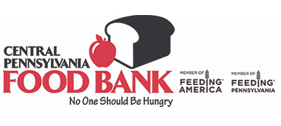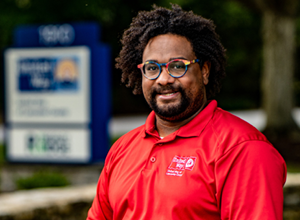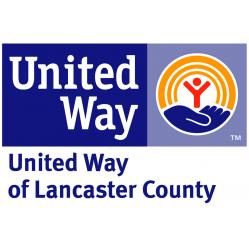Earlier this month we spoke with Kevin Ressler, Former CEO of United Way of Lancaster County, to celebrate Black History Month. His answers were thought provoking and insightful. It’s clear to see he has a passion to help others and continues to question the cause and effect of systematic injustices.
His work through the United Way Lancaster is vital to the growth of Lancaster’s communities. Continuing to dig deeper, advocating to address the root causes of systematic injustices while also addressing the immediate needs through the 2-1-1 resources.
Below he answers some of our questions. We are grateful for his leadership and partnership through the United Way Lancaster and his continued efforts to help lift up our neighbors in need.
What or who has been your biggest inspiration?
I’m fortunate to come from a long list of family members who are givers of their life and their time to others. My wife runs a nonprofit. I run a nonprofit. My younger brother does development for a nonprofit. His wife works for a nonprofit. My brother is an ER doctor. His wife is a school nurse. My dad volunteers to run a nonprofit on top of his day job. My mom works in higher education. My uncles have worked for UNICEF and other places like that. And my cousins worked for Oxfam and Save the Children and work in Yemen and Kenya and all these different places doing poverty relief. So my family on both sides are all over the world doing a lot of relief work.
It’s the legacy of my grandparents. Not only were they themselves very involved with church work, but they were the first Bishop in Africa for the Mennonite Church, and on my American side, my grandfather was a church planter in rural Ohio. And both of their wives, of course, had instrumental parts in their work. But their children and their grandchildren have continued to follow along with this mantle of helping people. And so, just been being able to be a part of the family and to continue being a part of that legacy and saying I’ve got a finite time on this world and limited opportunities of what I can do with that time and some of the best well-suited ways to utilize that time is to spend it endeavoring to help people who have less fortune or opportunity than I have.
And I have a story that I tell about my dad when I was in middle school, picking me up from playing basketball and telling me that for him and my mom, they didn’t really care whether my brothers were wealthy or poor or known or unknown or whatever the case may be, they just were really going to be proud if we helped people. And so that’s been sort of the biggest driver in my life. Thinking about that space and time that we’re afforded and what we can do with it. And we can spend it trying to run around, grabbing for ourselves or we can spend it trying to, you know, cut wider paths in the forest for everyone else to come past us.
What motivates you to pursue the United Way’s mission?
The fact that the United Way is trying to think about the systems-level issues is really valuable to me. Because I don’t want to spend my life helping individuals knowing that their children are going to face the exact same problems that they did. I am interested in how we respond to the symptoms of suffering that exist within a structure in society that is broken and its complete mechanisms. The sort of, grab everything for me, capitalism is just destructive from a societal level. And so, I want to make sure that I’m responding, and here at the United Way, we are responding whether it’s through 211 or our Vita program to individuals’ immediate needs.
But I’m really grateful that we’re trying to think about how are we using our resources to support and fund other organizations to go upstream of that and figure out well, why is that kid hungry? Because their parents aren’t able to have access to quality and high-paying jobs. Why are they not able to have that access? Well, some of that is they didn’t do well in school, or they chose not to do well in school. OK, well, today, what are the educational opportunities to get them back into a space where they’re prepared for economic sort of mobility? Well, now that we’ve solved that part, let’s also continue to look at why. Because they grew up poor and lived in low-quality housing. They were cold when they had to do their homework at night. It was demotivating. They weren’t comfortable. They didn’t have those strong supports. So, now we’re thinking about housing. We’re continually climbing upstream to figure out what caused the base-level event of the kid being hungry, but also asking why, what caused that and how do we alleviate that for the people right now and still focusing on symptoms. But also understanding we have to keep asking the question well, why did that happen? And then addressing those issues upstream from the incident itself. So then we start to recognize that individuals can’t get effective high-paying jobs when they have a criminal background or a felony in their past, so let’s focus on advocacy to change and transform how we give people second chances. Let’s focus on education to change how we think about opportunities while people are incarcerated. Or once they’ve reentered, how are we focusing on the reentry process? That now allows us downstream to get individual’s jobs. OK, poverty was the precipitating effect. OK, how do we focus on poverty alleviation? So downstream we can have a better effect on the individual. So that kind of thinking and allowance to work at the system level, instead of just the symptom level, is deeply motivating for me.
I like to use coats as an example. I’m not interested in coming next year and saying, ‘hey, we gave 500 coats to kids this year. We’re going to give 1000 coats to kids next year, right?’ If 1000 kids need a coat, sure. But I’m interested in saying, hey, this year we only need 250 coats because we were able to support families getting thriving, sustaining wage jobs, who can now buy their kids coats themselves. So, I don’t get excited about helping more people in need, I get excited about having less people in need that we need to help.
What does the partnership with the Central Pennsylvania Food Bank mean to you?
On a personal level, beyond the United Way, I’ve worked with Central Pennsylvania Food Bank since I was at Meals on Wheels, as well as, serving on the Hunger Free Lancaster Coalition. It has been really meaningful to have a partner who is willing to recognize that they’ve got solid streams of funding that would allow them, if they wanted to, to do the same thing they did yesterday, today and tomorrow. But this is a partner that is saying, no, we want to do more, we want to do better, we want to do things new. And I really appreciate having that kind of partner from both a thought leadership perspective, as well as an action leader in that space because it’s sometimes lonely in the nonprofit space. Trying to do innovation because a lot of our funders don’t want to fund innovation, they only want to fund what they knew worked to some degree in the past. And so having a leader like Joe Arthur, having people like Jennifer Powell, who I’m able to work with on the leadership level, and then the organization as a whole with people who are caring but not just caring about what we do today, but how we do it better tomorrow has always been really appreciated that partnership. And I’m excited about the way in which we continue to envision how new opportunities that come from government funding, or otherwise, allow us to continually transform the space. So, it’s just nice to be able to pick up the phone anytime I need to call Central Pennsylvania Food Bank and know that they’re going to be there to solve the immediate problem today and focus on how we start to re-envision how we reduce the problems tomorrow.
What gives you hope for the future?
The MLK quote about the moral arc of the universe is long but it bends towards justice.
I don’t actually always believe that. I think there are a lot of people who would gladly take the arc and twist it backwards and roll back the clock. And so there are sometimes that it feels like it’s two steps forward and one step back as we try to advance in society. But even in those cycles, I think that there is sort of a desire, a human desire, even when we sort of group ourselves in the Us versus them, there’s an inherent desire for people to see those whom they see as like themselves to advance things forward.
And so, as the world shrinks as it gets smaller, as we know more people from far places, things like xenophobia are less accessible to the human mind. Because once you encounter someone, you say, well, yeah, but you’re not like the rest of those people like you, and then you encounter two people and three people and five people and ten people, and at some point, you just can’t do that anymore. And as the world shrinks, this sort of bigotry inherently becomes more difficult. And very few people are sociopathic enough to actively pursue things that harm people for whom they have some level of empathy. So, as the world continues to interact with one another, we will continue to see one another like ourselves. And as we continue to see one another like ourselves, we will continue to fight not just for ourselves, but for them as well because we see them as like our own.
Things like the increase of interracial marriage and increases in the population of diverse workforces, or places to gather and worship, the sort of migratory patterns of the world where people are moving into different spaces that they couldn’t before- all those things give me hope that people are interacting with people who are otherwise strangers. And when you interact with people who were otherwise other you find that they are actually the same.


